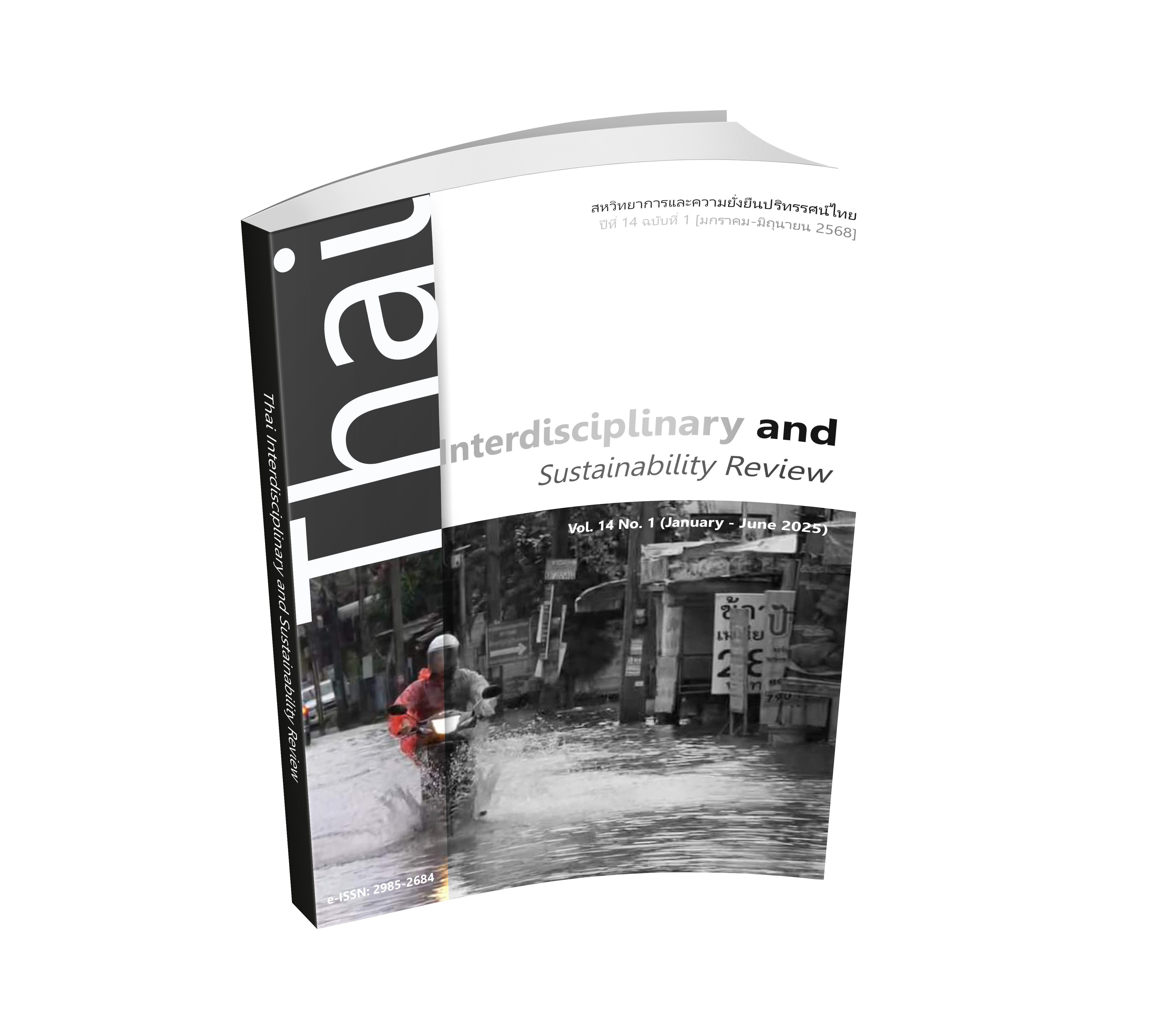PERCEIVED BENEFITS VS. PERCEIVED COSTS: KEY DRIVERS OF ORGANIC PERSONAL CARE PRODUCT PURCHASES IN BANGKOK AND METROPOLITAN AREA
DOI:
https://doi.org/10.14456/tisr.2025.3Keywords:
Attitude toward Buying, Subjective Norm, Trust, Past Experience, Purchase IntentionAbstract
This research aims to analyze the factors influencing the decision to purchase organic personal care products among consumers in Bangkok and its metropolitan areas. The factors examined include health awareness, appearance consciousness, purchasing attitudes, reference group conformity, confidence, and past experiences. Understanding consumer behavior in this segment is crucial for businesses and policymakers. This study employs a quantitative survey method, collecting data through questionnaires. The findings reveal that health awareness, appearance consciousness, purchasing attitudes, reference group conformity, confidence, and past experiences significantly influence the decision to purchase organic personal care products among consumers in Bangkok and its metropolitan areas. Notably, purchasing attitudes, confidence, and past experiences play pivotal roles as mediating variables in shaping consumer perceptions and driving purchasing behavior.
Downloads
References
Ajzen, I., & Fishbein, M. (1975). A Bayesian analysis of attribution processes. Psychological Bulletin, 82(2), 261-277.
Bamberg, S. (2003). How Does Environmental Concern Influence Specific Environmentally Related Behaviors? A New Answer to an Old Question. Journal of Environmental Psychology, 23(1), 21-32.
Chan, R., & Lau, L. (2002). Explaining green purchasing behavior: A cross-cultural study on American and Chinese consumers. Journal of International Consumer Marketing, 14(2-3), 9-40.
Chen, M. (2011). The joint moderating effect of health consciousness and healthy lifestyle on consumers’ willingness to use functional foods in Taiwan. Appetite, 57(1), 253-262.
Chiciudean, G., Harun, R., Ilea, M., Chiciudean, D., Arion, F., Ilies, G., & Muresan, I. (2019). Organic food consumers and purchase intention: a case study in Romania. Agronomy, 9(3), 145.
Ghazali, E., Mutum, D., & Mahbob, N. (2017). Revisiting the concept of green marketing: Environmental regulations and sustainable consumption. Procedia Economics and Finance, 7, 15-20.
Hair, J., Black, W., Babin, B., & Anderson, R. (2010). Multivariate Data Analysis. 7th ed. New York: Pearson.
Hillhouse, J., Turrisi, R., & Kastner, M. (2000). Modeling tanning salon behavioral tendencies using appearance motivation, self-monitoring and the theory of planned behavior. Health Education Research, 15(4), 405-414.
Honkanen, P., Verplanken, B., & Olsen, S. (2006). Ethical values and motives driving organic food choice. Journal of Consumer Behaviour: An International Research Review, 5(5), 420-430.
Kalafatis, S., Pollard, M., East, R., & Tsogas, M. (1999). Green marketing and Ajzen’s theory of planned behaviour: a cross-market examination. Journal of Consumer Marketing, 16(5), 441-460.
Kim, H., & Chung, J. (2011). Consumer purchase intention for organic personal care products. Journal of Consumer Marketing, 28(1), 40-47.
Koenigstorfer, J., Groeppel-Klein, A., & Kamm, F. (2014). Healthful Food Decision Making in Response to Traffic Light Color-Coded Nutrition Labeling. Journal of Public Policy & Marketing, 33(1), 65-77.
Laroche, M., Bergeron, J., & Barbaro-Forleo, G. (2001). Targeting consumers who are willing to pay more for environmentally friendly products. Journal of Consumer Marketing, 18(6), 503-520.
Palfreyman, Z., Chen, X., & Hu, T. (2013). The roles of experiential knowledge and belief in the theory of planned behavior: A study of consumer adoption of hedonic versus utilitarian innovations. Psychology & Marketing, 30(11), 987-998.
Patle, G., Kharpude, S., Dabral, P., & Kumar, V. (2020). Impact of organic farming on sustainable agriculture system and marketing potential: A review. International Journal of Environment and Climate Change, 10(11), 100-120.
Paul, J., & Rana, J. (2012). Consumer behavior and purchase intention for organic food. Journal of Consumer Marketing, 29(6), 412-422.
Pekdemir, C. (2018). On the regulatory potential of regional organic standards: Towards harmonization, equivalence, and trade?. Global Environmental Change, 50, 289-302.
Rose, S., Markman, B., & Sawilowsky, S. (2017). Limitations in the systematic analysis of structural equation model fit indices. Journal of Modern Applied Statistical Methods, 16(1), 69-85.
Schifferstein, H., & Ophuis, P. (1998). Health-related determinants of organic food consumption in the Netherlands. Food Quality and Preference, 9(3), 119-133.
Stattista. (2024). Beauty & personal care - worldwide. Retrieved from www.statista.com/outlook/cmo/beauty-personal-care/worldwide.
Suki, N. (2013). Consumers’ environmental responsibility and their purchase intention for green products: A case study of the Malaysian consumers. International Journal of Sustainable Development & World Ecology, 20(2), 154-159.
Sürücü, L., & Maslakci, A. (2020). Validity and reliability in quantitative research. Business & Management Studies: An International Journal, 8(3), 2694-2726.
Tarkiainen, A., & Sundqvist, S. (2005). Subjective norms, attitudes and intentions of Finnish consumers in buying organic food. British Food Journal, 107(11), 808-822.
Teng, C., & Lu, C. (2016). Organic food consumption in Taiwan: Motives, involvement, and purchase intention under the moderating role of uncertainty. Appetite, 105, 95-105.
Thøgersen, J., Zhou, Y., & Huang, G. (2016). How stable is the value basis for organic food consumption in China?. Journal of Cleaner Production, 134(A), 214-224.
Vergura, D., Zerbini, C., & Luceri, B. (2020). Consumers’ attitude and purchase intention towards organic personal care products. An application of the SOR model. Sinergie Italian Journal of Management, 38(1), 121-137.
Wang, Y., & Yu, C. (2017). Social interaction-based consumer decision-making model in social commerce: The role of word of mouth and observational learning. International Journal of Information Management, 37(3), 179-189.
Yadav, R., & Pathak, G. (2016). Intention to purchase organic food among young consumers: Evidences from a developing nation. Appetite, 96, 122-128.
Yazdanpanah, M., & Forouzani, M. (2015). Application of the Theory of Planned Behaviour to predict Iranian students' intention to purchase organic food. Journal of Cleaner Production, 107, 342-352.
Zeithaml, V. (1988). Consumer perceptions of price, quality, and value: a means-end model and synthesis of evidence. Journal of marketing, 52(3), 2-22.

Downloads
Published
How to Cite
Issue
Section
License
Copyright (c) 2025 Authors

This work is licensed under a Creative Commons Attribution-NonCommercial-NoDerivatives 4.0 International License.









.png)


